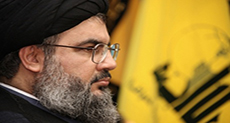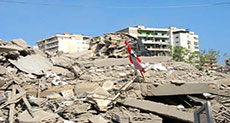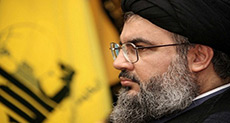
Another Confession: July War Missed Opportunity!

Source: Al-Manar TV, 22-10-2008
While Lebanon's Prime Minister Fouad Saniora doesn't miss any opportunity to deny Lebanon and its Resistance have achieved victory against the Zionist entity, the "Israeli" officials, who admitted the defeat and called on their leadership to deduce lessons, are still regretting the whole war, acknowledging that "Israel", that was believed to be one of the strongest armies in the region, had failed to triumph against Hizbullah.
The latest confession came from Oded Eran, a former senior "Israeli" diplomat and ambassador, and director of the Institute for National Security Studies in Tel Aviv through a political analysis that he wrote and was published by the Washington institute for near East policy two years after the implementation of UN Security Council Resolution 1701.
"When the Security Council adopted Resolution 1701, the international community missed an opportunity to provide UNIFIL the legal sanction to extend its territorial responsibility and functional mandate," Eran said. "As a result, Hizbullah has more than doubled its prewar arsenal of long- and short-range missiles and rockets by way of the porous Syrian-Lebanese border," he highlighted, adding that "in less than two years, Hizbullah has recovered from its losses and depletion of weapons stocks, primarily as a result of the Security Council's inability to adopt a more meaningful resolution."
The "Israeli" analyst pointed out that since "Israel's" withdrawal from southern Lebanon in 2000, Hizbullah has built a massive military infrastructure, both above and below ground. "Among "Israel's" 2006 war objectives was the destruction of that infrastructure, yet whatever was destroyed during the war has been reconstructed and fortified in the past two years, regardless of UNSCR 1701 and the presence of UNIFIL and the Lebanese Army," he regretted.
While rejecting the theories stating that the absence of any Hizbullah military offensive against "Israel" since 2006 had been attributed erroneously to UNSCR 1701, Eran stressed that "this restraint comes from the policy decision of Hizbullah leaders to focus on the domestic agenda and solidify their political position in Lebanon."
"Hizbullah has benefited tremendously from the loopholes in the resolution, fully recovering from the 2006 war and improving its political and military position in Lebanon," the "Israeli" former ambassador declared.
He warned that ""Israel" now faces a more formidable organization, one that is better supplied and entrenched than it was two years ago." He noted that "although "Israel's" reaction to the capture of two soldiers in 2006 took Hizbullah's leadership by surprise and may have increased "Israel's" regional deterrence, the mixed performance of the "Israeli" forces during the campaign undercut the shock value, making its impact of limited value and efficacy." And he proves his point of view: indeed, Hizbullah Secretary General Sayyed Hassan Nasrallah "continues to issue threatening statements and displays confidence in his organization's ability to weather another "Israeli" military campaign."
The "Israeli" former official concluded that the "buildup over the last two years accentuates "Israel's" desire to undermine the organization's position in Lebanon." According to him, logic suggests this can only be achieved by a successful military operation followed by a clear diplomatic solution. "Such an outcome would close the loopholes of UNSCR 1701 and force the Lebanese government and the international community to take concrete measures to implement UNSCR 1559," he claimed.
Eran ended his article by seeking to undermine the amount of regret and sorrow through betting on another war that "appears to be inevitable." However, if the "Israeli" military "currently is making preparations to ensure that the next round is decisive," Eran believes the most important thing is the diplomacy that would follow the conflagration. "Not only is it important to secure a meaningful UN resolution, it is also critical that the international community implement that resolution," he said.
While Lebanon's Prime Minister Fouad Saniora doesn't miss any opportunity to deny Lebanon and its Resistance have achieved victory against the Zionist entity, the "Israeli" officials, who admitted the defeat and called on their leadership to deduce lessons, are still regretting the whole war, acknowledging that "Israel", that was believed to be one of the strongest armies in the region, had failed to triumph against Hizbullah.
The latest confession came from Oded Eran, a former senior "Israeli" diplomat and ambassador, and director of the Institute for National Security Studies in Tel Aviv through a political analysis that he wrote and was published by the Washington institute for near East policy two years after the implementation of UN Security Council Resolution 1701.
"When the Security Council adopted Resolution 1701, the international community missed an opportunity to provide UNIFIL the legal sanction to extend its territorial responsibility and functional mandate," Eran said. "As a result, Hizbullah has more than doubled its prewar arsenal of long- and short-range missiles and rockets by way of the porous Syrian-Lebanese border," he highlighted, adding that "in less than two years, Hizbullah has recovered from its losses and depletion of weapons stocks, primarily as a result of the Security Council's inability to adopt a more meaningful resolution."
The "Israeli" analyst pointed out that since "Israel's" withdrawal from southern Lebanon in 2000, Hizbullah has built a massive military infrastructure, both above and below ground. "Among "Israel's" 2006 war objectives was the destruction of that infrastructure, yet whatever was destroyed during the war has been reconstructed and fortified in the past two years, regardless of UNSCR 1701 and the presence of UNIFIL and the Lebanese Army," he regretted.
While rejecting the theories stating that the absence of any Hizbullah military offensive against "Israel" since 2006 had been attributed erroneously to UNSCR 1701, Eran stressed that "this restraint comes from the policy decision of Hizbullah leaders to focus on the domestic agenda and solidify their political position in Lebanon."
"Hizbullah has benefited tremendously from the loopholes in the resolution, fully recovering from the 2006 war and improving its political and military position in Lebanon," the "Israeli" former ambassador declared.
He warned that ""Israel" now faces a more formidable organization, one that is better supplied and entrenched than it was two years ago." He noted that "although "Israel's" reaction to the capture of two soldiers in 2006 took Hizbullah's leadership by surprise and may have increased "Israel's" regional deterrence, the mixed performance of the "Israeli" forces during the campaign undercut the shock value, making its impact of limited value and efficacy." And he proves his point of view: indeed, Hizbullah Secretary General Sayyed Hassan Nasrallah "continues to issue threatening statements and displays confidence in his organization's ability to weather another "Israeli" military campaign."
The "Israeli" former official concluded that the "buildup over the last two years accentuates "Israel's" desire to undermine the organization's position in Lebanon." According to him, logic suggests this can only be achieved by a successful military operation followed by a clear diplomatic solution. "Such an outcome would close the loopholes of UNSCR 1701 and force the Lebanese government and the international community to take concrete measures to implement UNSCR 1559," he claimed.
Eran ended his article by seeking to undermine the amount of regret and sorrow through betting on another war that "appears to be inevitable." However, if the "Israeli" military "currently is making preparations to ensure that the next round is decisive," Eran believes the most important thing is the diplomacy that would follow the conflagration. "Not only is it important to secure a meaningful UN resolution, it is also critical that the international community implement that resolution," he said.



